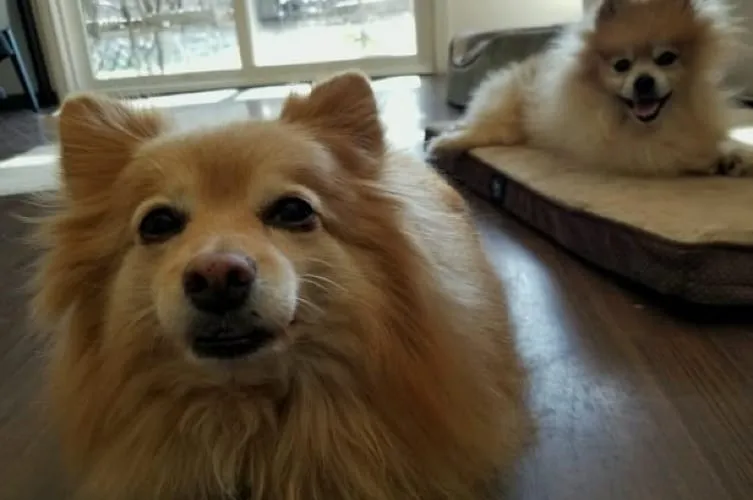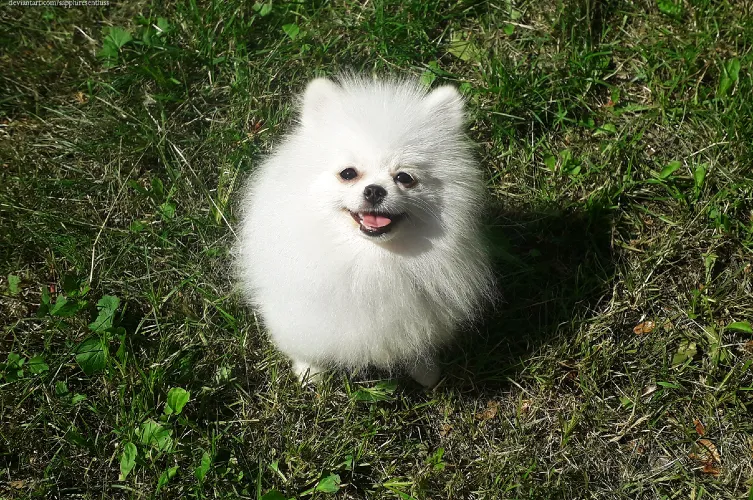Pomeranians are small, fluffy dogs that have become popular pets in recent years due to their adorable appearance and charming personalities. However, many potential pet owners wonder if Pomeranians are aggressive and if they are suitable pets for families with children.
When it comes to aggression, Pomeranians are generally not considered to be an aggressive breed. In fact, they are known for their friendly and outgoing personalities. However, like all dogs, Pomeranians can become aggressive if they are not properly socialized or trained. It is important for pet owners to understand the temperament of their Pomeranian and to take steps to prevent any aggressive behavior from developing.
Overall, Pomeranians can make wonderful pets for families with children. They are affectionate, playful, and loyal companions that are sure to bring joy to any household. However, it is important for pet owners to be aware of the potential for aggression and to take steps to prevent any issues from arising. With proper care and attention, Pomeranians can be excellent pets for individuals and families alike.
Understanding Pomeranian Temperament

Breed Personality Traits
Pomeranians are known for their lively and playful personalities. They are intelligent dogs that are quick to learn new tricks and commands. Pomeranians are also fiercely loyal to their owners and make excellent companions.
Despite their small size, Pomeranians have a big personality and can sometimes be stubborn. They are also known to be vocal and may bark excessively if not properly trained.
Signs of Aggression in Pomeranians
While Pomeranians are generally friendly and affectionate, they can exhibit signs of aggression if they feel threatened or anxious. Some common signs of aggression in Pomeranians include growling, snarling, biting, and snapping.
It is important to note that aggressive behavior in Pomeranians is not necessarily a breed trait, but rather a result of poor socialization or training. Proper socialization and training from a young age can help prevent aggressive behavior in Pomeranians.
Owners should also be aware of situations that may trigger aggressive behavior in their Pomeranians, such as being approached by unfamiliar dogs or people. It is important to keep a close eye on your Pomeranian's behavior and intervene if necessary to prevent any aggressive incidents.
In summary, while Pomeranians are generally friendly and playful dogs, they can exhibit signs of aggression if not properly socialized or trained. Owners should be aware of their Pomeranian's behavior and take steps to prevent any aggressive incidents.

Causes of Aggression
Aggression is a behavior that can be displayed by any dog breed, including Pomeranians. There are several reasons why Pomeranians may exhibit aggressive behavior, including fear and anxiety, pain and health issues, protective and guarding instincts, and poor socialization.
Fear and Anxiety
Fear and anxiety can cause Pomeranians to become aggressive. Pomeranians may feel threatened by new people, unfamiliar environments, or loud noises, and may respond aggressively to protect themselves. In some cases, fear and anxiety can also be caused by previous traumatic experiences, such as abuse or neglect.
Pain and Health Issues
Pain and health issues can also cause Pomeranians to become aggressive. Dogs may become aggressive when they are in pain or discomfort, and may lash out at anyone who tries to touch them. Health issues, such as thyroid imbalances, can also cause aggression in Pomeranians.
Protective and Guarding Instincts
Pomeranians are known for their protective and guarding instincts, and may become aggressive when they feel their territory or family is being threatened. This can include aggressive behavior towards strangers, other animals, or even family members who they perceive as a threat.
Poor Socialization
Poor socialization can also lead to aggressive behavior in Pomeranians. Dogs that are not properly socialized may become fearful or anxious in new situations, and may respond aggressively as a result. Pomeranians that are not exposed to a variety of people, animals, and environments may also become more territorial and protective of their home and family.
In conclusion, there are several factors that can contribute to aggressive behavior in Pomeranians. It is important for owners to understand these causes and work to address them in order to prevent aggressive behavior. With proper training, socialization, and management, Pomeranians can be loving and well-behaved pets.

Training and Socialization
Importance of Early Socialization
Pomeranians are known for being loyal and affectionate pets, but without proper socialization, they can develop aggressive tendencies towards other dogs and strangers. Early socialization is crucial for preventing these behaviors from developing. Pomeranians should be exposed to different people, animals, and environments from a young age to help them become well-adjusted and confident adults.
Training Techniques to Reduce Aggression
Positive reinforcement techniques are the most effective way to train a Pomeranian and prevent aggressive behavior. Punishment-based training methods can actually make aggression worse and damage the bond between the dog and owner. Using treats, praise, and toys to reward good behavior can help a Pomeranian learn to associate positive experiences with appropriate behavior.
Professional Help from Behaviorists
If a Pomeranian is already displaying aggressive behavior, it's important to seek professional help from a qualified, positivity-based dog trainer or behaviorist. They can help identify the root cause of the aggression and develop a personalized training plan to address it. It's important to choose a behaviorist who uses positive reinforcement techniques and has experience working with small breeds like Pomeranians.
Overall, with proper socialization and positive reinforcement training techniques, Pomeranians can be well-behaved and loyal pets. It's important for owners to take the time to properly train and socialize their Pomeranian to prevent aggressive behavior.

Managing Aggressive Behavior
Pomeranians are known to display aggressive behavior in certain situations. It is important for owners to understand how to manage this behavior to ensure the safety of both the dog and those around them.
Communication and Body Language
Effective communication with a Pomeranian is key to managing their aggressive behavior. Owners should use clear and consistent cues to communicate with their dog. They should also be aware of their body language, as Pomeranians are very perceptive to nonverbal cues.
Creating a Positive Environment
Creating a positive environment can help prevent aggressive behavior in Pomeranians. Owners should provide their dog with plenty of exercise and mental stimulation to prevent boredom and frustration. A comfortable and safe living space is also important for a Pomeranian's well-being.
Dealing with Barking, Growling, and Biting
Barking, growling, and biting are common aggressive behaviors displayed by Pomeranians. Owners should address these behaviors immediately and consistently. Time-out can be an effective tool for managing these behaviors. A designated time-out area should be created where the Pomeranian can calm down and be separated from the situation causing the aggressive behavior.
In summary, managing aggressive behavior in Pomeranians requires effective communication, creating a positive environment, and addressing specific aggressive behaviors such as barking, growling, and biting. By understanding and implementing these strategies, owners can help their Pomeranian become a well-behaved and happy companion.

Living with a Pomeranian
Pomeranians are known for their lively and playful personalities, making them a popular choice for families. However, living with a Pomeranian requires some adjustments in the family setting to ensure a harmonious relationship between the dog and its human family members.
Adjustments in Family Settings
Pomeranians are social animals and require attention and interaction from their owners. They are also known to be territorial and may become possessive of their toys, food, and space. Therefore, it is essential to establish clear boundaries and rules for the dog to follow.
Owners should also provide plenty of exercise and mental stimulation to keep their Pomeranian well-adjusted and prevent destructive behavior. This can include daily walks, playtime, and training sessions.
Interactions with Children and Other Pets
When it comes to interactions with children and other pets, socialization is key. Pomeranians that are well-socialized from a young age tend to be more comfortable around children and other pets.
It is important to supervise interactions between Pomeranians and young children to prevent accidental injuries. Pomeranians may also become jealous or possessive of their owners, so it is essential to teach them how to share attention and space with other pets.
In conclusion, living with a Pomeranian can be a rewarding experience for families who are willing to make the necessary adjustments and provide the dog with proper socialization, exercise, and mental stimulation. By following these guidelines, owners can ensure a happy and well-adjusted Pomeranian that is a joy to be around.
Recognizing and Preventing Aggression

Identifying Types of Aggression
Pomeranians, like all dogs, may exhibit various types of aggression. It is essential to recognize the type of aggression to determine the appropriate approach for preventing it.
One type of aggression is fear-based aggression, which is a response to a perceived threat or danger. This may manifest as growling, barking, or biting. Another type is territorial aggression, which occurs when a dog perceives a threat to its territory or belongings. This may include growling or biting when someone approaches the dog's food bowl or toys. Finally, there is dominance aggression, which occurs when a dog perceives itself as the pack leader and may attempt to assert its dominance over humans or other dogs.
Strategies to Prevent Aggressive Behavior
Preventing aggressive behavior in Pomeranians requires a proactive approach. One of the most effective strategies is socialization. Exposing Pomeranians to different people, animals, and environments from a young age can help them develop confidence and reduce the likelihood of fear-based aggression.
Another strategy is bite inhibition training. This involves teaching Pomeranians to control the force of their bites, which can help prevent injuries if they do become aggressive.
Owners can also prevent aggressive behavior by establishing themselves as the pack leader. This involves setting clear rules and boundaries and consistently enforcing them. Providing Pomeranians with plenty of exercise and mental stimulation can also help prevent boredom and frustration, which can lead to aggressive behavior.
In conclusion, while Pomeranians may exhibit aggressive behavior, it is possible to prevent it through socialization, bite inhibition training, and establishing clear rules and boundaries. By taking a proactive approach, owners can help ensure that their Pomeranians are well-behaved and happy pets.
Breed-Specific Considerations
Pomeranian History and Breed Lineage
Pomeranians, also known as Poms, are a breed of dog that originated in the Pomerania region (now part of Germany and Poland) in the 18th century. They were originally bred as working dogs and were used to herd sheep and pull sleds. However, their small size and friendly personality made them popular as companion dogs, and they became a popular breed among European royalty.
Pomeranians are a breed of the German Spitz family, which includes other breeds such as the Keeshond and the Samoyed. They are one of the smallest breeds in the Spitz family, weighing between 3 and 7 pounds.
Comparing Pomeranians to Other Breeds
When it comes to breed personality, Pomeranians are known for being friendly, playful, and energetic. They are also intelligent and can be trained easily. However, like all breeds, Pomeranians have their own unique personalities and may not be a good fit for every household.
According to data from the American Kennel Club, Pomeranians are not among the top 10 breeds that are responsible for the most dog bites. However, it is important to note that any dog, regardless of breed, can become aggressive if not properly socialized, trained, and cared for.
In summary, Pomeranians are a breed of dog with a rich history and a unique personality. While they are generally friendly and playful, it is important to remember that all dogs require proper training and socialization to prevent aggression.
Expert Insights

Advice from Breeders and Trainers
The general consensus among reputable Pomeranian breeders and trainers is that Pomeranians are not naturally aggressive dogs. However, like any breed, they can exhibit aggressive behavior if not properly socialized and trained. According to Denise Leo, author of "The Pomeranian Handbook," Pomeranians are watchdogs by nature and may bark or growl to alert their owners of potential threats. However, this behavior can be managed through proper training and socialization.
Responsible breeders emphasize the importance of early socialization to prevent fear aggression. Pomeranians that are exposed to different environments, people, and animals at a young age are more likely to develop friendly behavior as adults. Trainers recommend positive reinforcement training methods to encourage good behavior and discourage aggressive behavior.
Veterinary Perspectives on Aggression
The American Veterinary Medical Association (AVMA) states that aggression in dogs is a serious issue that requires prompt attention from a veterinarian. While Pomeranians are not typically aggressive, fear aggression can develop in any breed. Fear aggression occurs when a dog feels threatened and responds aggressively to protect itself.
Veterinarians recommend regular check-ups to monitor a dog's behavior and address any issues before they escalate. If a Pomeranian exhibits aggressive behavior, a veterinarian can perform a physical exam and recommend behavior modification techniques or medication if necessary.
Notable Literature on Pomeranian Behavior
There are several books and articles available on Pomeranian behavior that can provide insights into the breed's temperament. "The Pomeranian Handbook" by Denise Leo is a comprehensive guide to the breed that covers topics such as training, socialization, and health. "Watchdogs and Lapdogs: A Guide to Breeds" by Catherine Britton provides an overview of the Pomeranian breed and its characteristics.
It is important to note that not all literature on Pomeranian behavior is created equal. It is recommended to consult reputable sources and avoid exaggerated or false claims.
Conclusion
In summary, Pomeranians are popular for their charming personalities and fluffy appearance, making them appealing family pets. Generally, they are not aggressive, but their behavior significantly depends on proper socialization and training. They are intelligent, lively, and loyal but can display aggressive tendencies if provoked or inadequately trained.
Early and consistent socialization is crucial in shaping a well-adjusted Pomeranian, as it helps them become comfortable with various situations, people, and other animals. Positive reinforcement techniques in training are recommended to manage any potential aggressive behaviors, such as excessive barking or snapping.
Family adjustments are necessary when living with a Pomeranian, especially around children and other pets. Ensuring they receive ample attention, exercise, and mental stimulation is key to preventing boredom and frustration, which can lead to undesirable behaviors.
Understanding the root causes of aggression, like fear, anxiety, or health issues, is essential. Implementing strategies like socialization, bite inhibition training, and establishing a clear hierarchy can effectively prevent and manage aggression.
Owners are advised to seek guidance from breed experts, trainers, and veterinarians to better understand and care for their Pomeranian. With the right approach to training and care, Pomeranians can be delightful, affectionate companions for families and individuals alike.
FAQs
- Are Pomeranians Aggressive by Nature?
- Pomeranians are not inherently aggressive. They are known for their friendly and outgoing personalities. However, like any breed, they can develop aggressive tendencies due to factors like lack of socialization, improper training, or negative experiences. It's important to understand that any dog's behavior is influenced more by upbringing and environment than by breed alone.
- How Important is Socialization for Pomeranians?
- Socialization is crucial for Pomeranians. Exposing them to different people, animals, environments, and experiences from a young age helps them become well-adjusted and confident adults. Proper socialization can significantly reduce the likelihood of fear-based aggression and other behavioral issues.
- What Training Methods Work Best for Pomeranians?
- Positive reinforcement training methods are most effective for Pomeranians. This includes using treats, praise, and affection to reward desirable behaviors. Avoid punishment-based methods, as they can lead to fear and aggression. Consistency and patience are key, and training should start from an early age.
- Can Pomeranians be Good Family Pets?
- Yes, Pomeranians can be excellent family pets. They are affectionate, loyal, and often form strong bonds with their family members. However, due to their small size, interactions with very young children should be supervised to prevent accidental injury to the dog or child.
- What are Common Triggers of Aggression in Pomeranians?
- Common triggers of aggression in Pomeranians include fear, anxiety, territoriality, and possessiveness. Situations that may provoke aggression include unfamiliar people or animals entering their space, feeling threatened, or being in pain. Understanding and avoiding these triggers can help manage aggressive behaviors.
- How to Manage Aggressive Behaviors in Pomeranians?
- Managing aggressive behaviors in Pomeranians involves consistent training, providing a stable environment, and avoiding situations that trigger aggression. Redirecting their attention during aggressive episodes and reinforcing positive behaviors are effective strategies. If aggression is a concern, consulting a professional dog trainer or behaviorist is advisable.
- What Should I Do if My Pomeranian Shows Signs of Aggression?
- If your Pomeranian shows signs of aggression, it's important to first ensure there's no medical cause. Consult a veterinarian to rule out any health issues. For behavioral aggression, seek the assistance of a professional dog trainer or a canine behaviorist. They can provide personalized guidance and training strategies to address and correct the behavior.




